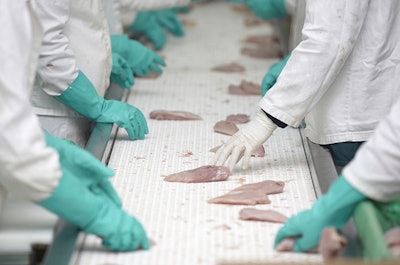
Organic poultry processed in a split facility was less likely to be contaminated with pathogens compared to conventionally processed meat, revealed research from the Johns Hopkins Bloomberg School of Public Health.
“I think the main finding that we have is, when it comes to the exposures consumers may have and therefore the potential risks from meat, that both production and processing matter,” Meghan Davis, associate professor in the Department of Environmental Health and Engineering at the Bloomberg School, said.
“In this, we identified that the organic label was associated with lower odds of having contamination with multi-drug resistant organisms. We also looked at contamination with any bacteria and, in this, we found that split processors had a lower prevalence of contamination with any bacteria.”
More than 48 million Americans get sick from a foodborne illness each year and 3,000 people die as a result, the Center for Disease Control and Prevention (CDC) estimates. Contaminated poultry meat is the underlying cause of 19% of deaths attributed to foodborne illnesses.
Organic vs. conventional meat contamination
The study, published in Environmental Health Perspectives, analyzed the bacterial contamination data from 39,348 chicken breast, ground beef, ground turkey and pork samples collected between 2012 and 2017 as part of the U.S. National Antimicrobial Resistance Monitoring System (NARMS).
Organic-certified meats were 56% less likely to be contaminated with multi-drug resistant bacteria, the research showed. Four percent of the conventionally processed meat was contaminated with at least one strain of multi-drug resistant bacteria, while only 1% of the organic meat displayed any kind of contamination.
Facility type could matter
The research also revealed that the type of processing facility may also have an impact on the likelihood of contamination with a pathogen.
Facilities that processed only conventional meat had bacterial contamination one-third of the time. Organic meat processed at a split facility – that handles both organic and conventional meat – were contaminated only one quarter of the time. Conventional meat had the same rate of contamination at both facilities.
The researchers believe that the differing levels of contamination between organic and conventional meat is due to the additional cleaning of equipment required in organic meat processing.
“It may be that the processing environment itself is one place where bacteria could persist and additional cleaning could help to get rid of them,” Davis explained.
Like what you just read? Sign up now for free to receive the Poultry Future Newsletter.


















